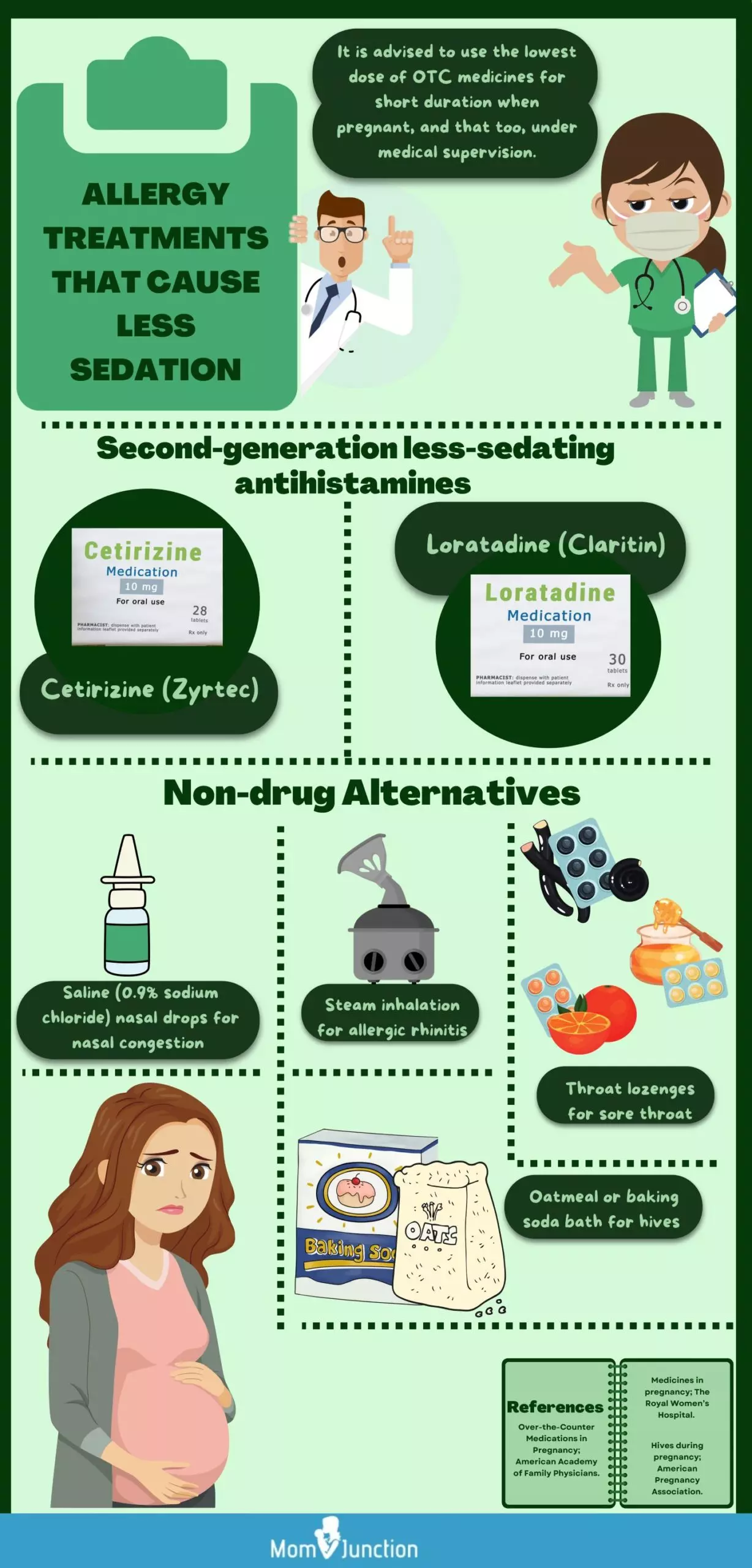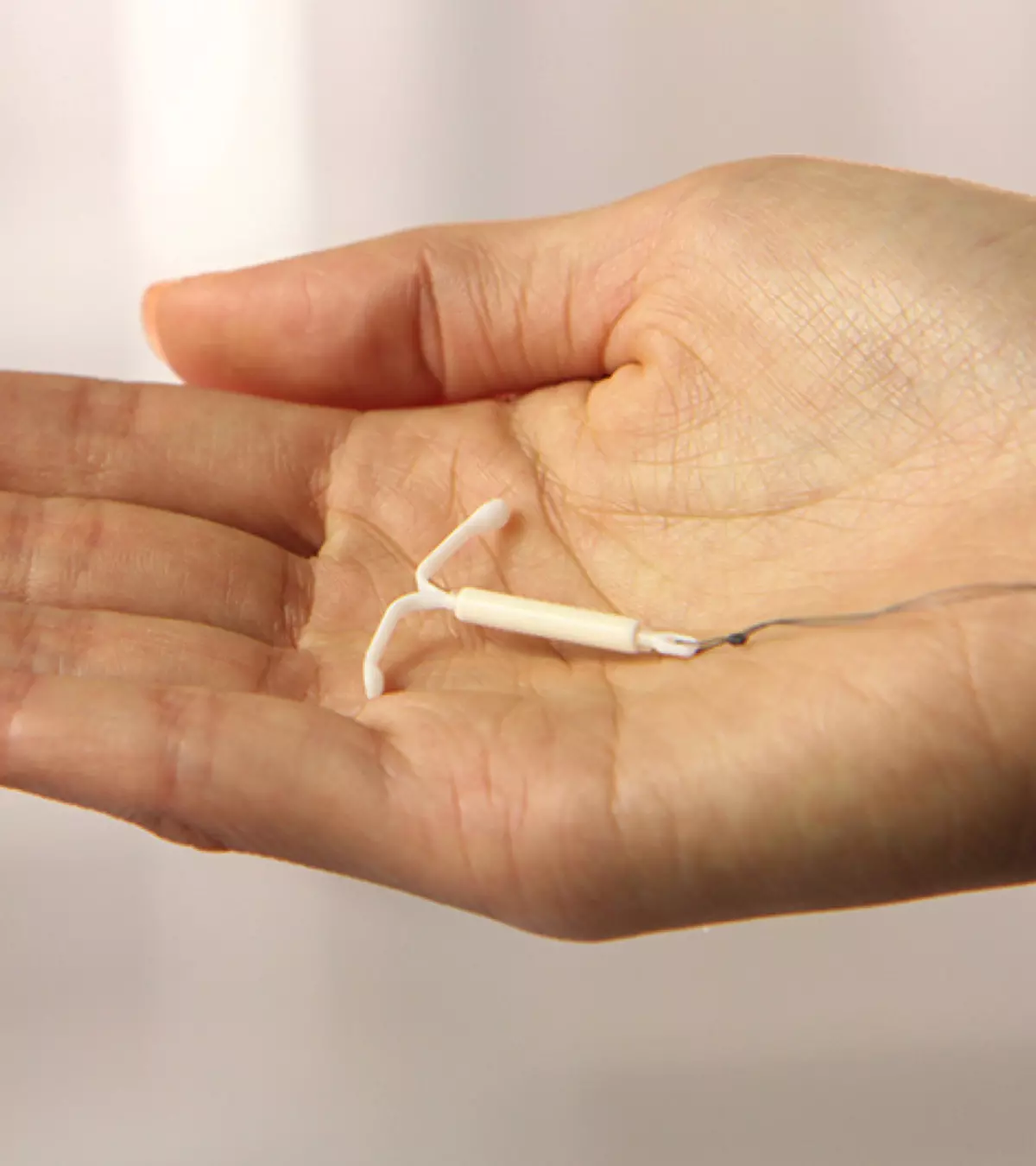
Image: Shutterstock
Benadryl is an over-the-counter (OTC) medication that helps relieve allergies, colds, coughs, and sleeplessness. Although this medication is commonly used, you may want to know if you can take Benadryl while pregnant. Pregnancy can weaken the immune system and make a pregnant woman more susceptible to infections (1). Thus, pregnant women may often resort to taking Benadryl. However, before using Benadryl to relieve the symptoms of your illness, it is important to consult a doctor.
Key Pointers
- Benadryl is an antihistamine used to treat coughs, colds, and allergies.
- It is generally considered safe during pregnancy, but the dosage and frequency must be prescribed by a doctor.
- Women with liver, kidney, breathing, or gastrointestinal issues should avoid the medication.
- Side effects of Benadryl may include drowsiness, dry mouth, constipation, and anorexia.
- In rare cases, it may cause adverse fetal outcomes, especially when taken in the first trimester.
What Is Benadryl?

Benadryl, also known as diphenhydramine, is a type of antihistamine that is used to treat a cough, cold, itching, watery eyes, hives, and other allergic reactions.
The drug is available in two major forms, tablets and syrup (2). Other brand names for diphenhydramine include Sominex, Nytol, and Unisom.
Is It Safe To Take Benadryl (Diphenhydramine) While Pregnant?
Yes, it is safe to take Benadryl during pregnancy, but only after consulting your doctor.
The US Food and Drug Administration lists Benadryl as a category B drug for pregnancy risks, which means that it has no known harmful side effects (3). However, there is no proof that it is entirely safe during pregnancy, and it should only be taken if prescribed by a doctor, as it may adversely affect maternal health.
How Much Benadryl Is Safe To Take During Pregnancy?

The recommended oral dosage of Benadryl is 25mg to 50mg (one to two Benadryl tablets) once every four to six hours as suggested by the doctor for mild symptoms. Your doctor may prescribe an oral dosage of up to 300 mg/day for more severe symptoms (4). This recommended dosage of Benadryl is for all adults, including pregnant women.
Taking Benadryl while pregnant can sometimes lead to drowsiness or dizziness, so avoid activities such as driving or working with tools or machinery when you are on this medication. In any case, take the dosage prescribed by the doctor to stay safe.
What Are Some Reasons Women Take Benadryl During Pregnancy?
Benadryl has been considered safe for pregnant women if prescribed by the doctor; so your doctor may prescribe Benadryl for managing and treating (4):
- Allergy symptoms
- Insomnia
- Cough
- Skin rashes (pruritus)
- UrticariaiA skin rash characterized by itchy bumps, often triggered by certain foods or medications.
- Symptoms of motion sickness, including dizziness, nausea, and vomiting
What Could Be The Side Effects Of Benadryl During Pregnancy?

Benadryl is not linked to any congenital abnormalities but may cause some potentially adverse side effects. Some of the common side effects of Benadryl include (4):
- Headache
- Constipation
- Drowsiness
- DysuriaiPain, discomfort, or burning sensation during urination.
- Dry mouth
- Blurry vision
- HypotensioniA sudden drop in blood pressure leading to fatigue and dizziness.
- Urinary retention
- AnorexiaiAn eating disorder characterized by reduced food intake and extremely low body weight.
When taken in excess, it could put the mother at risk of the following conditions.
- Nervous system effects: Benadryl has sedating qualities and causes drowsiness, which can lead to depression in the long term. It also causes seizures, light-headedness, blurred vision, hypertension and hypotension, loss of appetite, hallucinations, nervousness, and insomnia (5).
- Hypersensitivity: Studies by the John Hopkins University showed that diphenhydramine could cause hypersensitivity that could lead to rashes, eczema, and pruritus (6).
- Cardiovascular and gastrointestinal problems: Headaches, hypotension, palpitationsiAbnormal heart rhythms often caused by stress, anxiety, or medical conditions. and tachycardiaiA condition in which the heart rate is more than normal (i.e.,100 beats per minute). , and mild gastrointestinal issues such as nausea, vomiting, and dry mouth are also noticed (7).
 Quick fact
Quick factWhat Are The Effects Of Taking Benadryl On The Unborn Baby?
While Benadryl is safe to be taken during all trimesters of pregnancy, if taken in excess or for more than recommended duration, it may also put the unborn baby at risk.
- Fetal morbidity: Benadryl, in combination with another drug Restoril (or temazepam used for treating anxiety), is likely to increase the risks of fetal morbidity (8).
- Congenital abnormalities: Studies show that taking diphenhydramine (Benadryl) in the first trimester can increase the chances of faulty fetal development and may lead to conditions such as cleft lip or cleft lip or palateiA congenital disability where the baby’s lip or palate (roof of the mouth) is abnormally developed. (9). However, recent studies showed no correlation between Benadryl and fetal malformations (10).
 Point to consider
Point to considerWhen To Avoid Benadryl During Pregnancy?
Stay off Benadryl if you have any of the following:
- ColostomyiA surgical procedure to provide an opening to the colon (large intestine) through the abdominal wall. or ileostomyiA surgical procedure to provide an opening to the ileum (small intestine) through the abdominal wall
- Breathing issues such as asthma

- Gastro and intestinal conditions
- Liver and kidney problems
- Urinary problems
- GlaucomaiAn eye condition where optic nerves are damaged due to increased pressure on the eyes, leading to gradual vision loss.
- Blood pressure
- Thyroid problem
What Are The Alternatives To Benadryl During Pregnancy?
If you are still concerned about taking Benadryl during pregnancy, you can opt for other alternatives. However, do consult a doctor before trying any of these. Your doctor can suggest the right dose of OTC medicines based on your trimester.
- You may consider OTC nasal steroid sprays, budesonide, and fluticasone propionate, for managing allergy symptoms during pregnancy (11).
- Home remedies, such as gargling with salt water, using saline nasal and eye drops, and steam inhalation, may also help manage allergy and cold symptoms during pregnancy (12).
Sharing some home-care measures that proved effective in alleviating her cold symptoms during pregnancy, Maria Ingrid, a mother of two, says, “At some point, my immune system probably dropped, the reason why I had a sore throat and colds. My doctor gave me medicines at that time, but I never took any of them because of fear that something may happen to our little one. However, after a few days of drinking lemon water with honey and gargling warm water with salt, I felt better (i).”
- You may consider aromatherapy using essential oils to manage insomniaiA sleep disorder that makes it difficult for one to fall asleep, stay asleep, or get a sound sleep. . (13). Research has shown that using topical lavender essential oil improves sleep quality in pregnant women. Furthermore, lavender aromatherapy paired with classical music is known to decrease anxiety levels (14). Some other ways to relax include meditation or gentle self-massage before sleep (15).
- Your doctor may also prescribe second-generation antihistaminesiA class of medications used to treat allergies by blocking the action of histamines (allergens). , including loratadine and cetirizine, as an alternative to Benadryl since they usually cause less drowsiness (16). Studies have shown that loratadine does not increase the risk of birth defects when used during pregnancy (17). Similarly, cetirizine is considered safe for use during pregnancy and is not associated with an increased risk of malformations or adverse delivery outcomes (18).
Frequently Asked Questions
1. Is Benadryl cream safe during pregnancy?
It is safe to use topical Benadryl during pregnancy as there are no known effects of it. It is used to treat allergies or an irritant reaction on the skin. Check with your doctor before using it anyway (3).
2. Can I take Tylenol and Benadryl together while pregnant?
Tylenol is used for treating muscle aches and pain associated with the common cold (19). Benadryl is used for treating allergy symptoms (4). They are safe when taken separately, but check with your doctor before taking them together, as the effect of these medicines may not be the same for all.
3. Can I take Benadryl every night while pregnant?
Do not take Benadryl (diphenhydramine) or any other drug during pregnancy without your doctor’s advice. Any drug should be avoided during the first trimester as it’s the organogenesis phase, where the baby is being formed. Even if needed, Benadryl can be used for symptomatic relief during second and third trimesters in the short term and not daily. Discuss with your doctor.
4. Can I use Benadryl spray during pregnancy?
Benadryl itch relief spray is safe to use during pregnancy. It temporarily relieves pain and itching caused by cuts/burns/scrapes, rashes, insect bites, skin irritations, and more. However, you should check with your doctor before using it (3).
5. Does Benadryl cross the placenta?
Yes. Benadryl can cross the placenta, although its effects on the fetus are not fully known. Thus, for this reason, you must have only the dosage prescribed by your doctor for a specific duration (3).
Infographic: Less Sedating Options For Allergies During Pregnancy
First-generation antihistamines, such as diphenhydramine, may be preferred during pregnancy. However, these drugs can cause drowsiness, which may make a pregnant woman accident-prone. Keep this infographic handy if you wish to know non-sedating options for treating your allergic condition. Illustration: Momjunction Design Team
You should be very careful while taking medications during pregnancy, especially during the first trimester. No medicine is 100% safe and should be taken only after consulting a doctor. So, if you get yourself thinking, “Can you take Benadryl while pregnant?”- The answer is YES. Benadryl during pregnancy is usually safe, but its usage should be restricted to a minimum and only when prescribed by a physician. It may cause drowsiness, gastrointestinal problems, headaches, or palpitations. So, it is advisable to avoid self-medication and try dealing with minor allergies without using medications.
Illustration: Benadryl When Pregnant Safety Dosage And Side Effects

Image: Dall·E/MomJunction Design Team
Personal Experience: Source
MomJunction articles include first-hand experiences to provide you with better insights through real-life narratives. Here are the sources of personal accounts referenced in this article.
i. Motherhood | My 9 month pregnancy journey;https://mariaingrid.com/2018/11/18/motherhood-my-9-month-pregnancy-journey/
References
- Gil Mor and Ingrid Cardenas; (2011); The Immune System in Pregnancy: A Unique Complexity.
https://www.ncbi.nlm.nih.gov/pmc/articles/PMC3025805/ - LABEL: BENADRYL- diphenhydramine hydrochloride tablet film coated.
https://dailymed.nlm.nih.gov/dailymed/drugInfo.cfm?setid=de2a64ce-c169-4162-b79e-d3809bea2147 - Sumit Kar et al.; (2012); A review of antihistamines used during pregnancy.
https://www.ncbi.nlm.nih.gov/pmc/articles/PMC3356948/ - Vincent Sicari and Christopher P. Zabbo; (2021); Diphenhydramine.
https://www.ncbi.nlm.nih.gov/books/NBK526010/ - Antihistamine Toxicity
https://www.ncbi.nlm.nih.gov/books/NBK482318/ - Acute Hypersensitivity Reactions: What Nurses Need to Know.
https://nursing.jhu.edu/magazine/2011/04/acute-hypersensitivity-reactions-what-nurses-need-to-know/ - diphenhydramine hydrochloride injection (Diphenhydramine Hydrochloride Injection) injection, solution.
https://dailymed.nlm.nih.gov/dailymed/archives/fdaDrugInfo.cfm?archiveid=1192 - GA Kargas, et al.; (1985); Perinatal Mortality Due to Interaction of Diphenhydramine and Temazepam.
https://www.nejm.org/doi/10.1056/NEJM198511283132215?url_ver=Z39.88-2003&rfr_id=ori:rid:crossref.org&rfr_dat=cr_pub%20%200pubmed - Suzanne M. Gilboa et al.; (2009); Use of Antihistamine Medications During Early Pregnancy and Isolated Major Malformations.
https://www.ncbi.nlm.nih.gov/pmc/articles/PMC3619228/ - Qian Li MS, et al.; (2013); Assessment of Antihistamine Use in Early Pregnancy and Birth Defects.
https://www.sciencedirect.com/science/article/abs/pii/S2213219813003024 - Intranasal steroids in pregnancy.
https://www.aaaai.org/allergist-resources/ask-the-expert/answers/old-ask-the-experts/pregs - Medications Safe For Pregnancy.
https://hospital.uillinois.edu/primary-and-specialty-care/family-birth-place/prenatal-care/your-pregnancy-overview/medications-safe-for-pregnancy - Aromatherapy – Uses For Pleasure & Well Being.
http://ssbea.mercer.edu/patelt/aromath.htm - Vidal-García, Eulàlia, et al.; (2024); Efficacy of Lavender Essential Oil in Reducing Stress, Insomnia, and Anxiety in Pregnant Women: A Systematic Review.
https://pmc.ncbi.nlm.nih.gov/articles/PMC11641599/#sec2-healthcare-12-02456 - How to Get Sleep During Pregnancy.
https://www.lancastergeneralhealth.org/health-hub-home/motherhood/your-pregnancy/how-to-get-sleep-during-pregnancy - Pregnancy and Allergy.
https://acaai.org/allergies/allergies-101/who-gets-allergies/pregnancy-and-allergy/ - Loratadine (Claritin®).
https://www.ncbi.nlm.nih.gov/books/NBK582799/ - So, Miranda, et al. (2010); Safety of Antihistamines during Pregnancy and Lactation; Canadian Family Physician.
https://pmc.ncbi.nlm.nih.gov/articles/PMC2868610/ - Acetaminophen risk in pregnancy: What patients need to know.
https://utswmed.org/medblog/acetaminophen-pregnancy-risks/#:~:text=Such%20is%20the%20case%20with,safe%20to%20use%20during%20pregnancy. - Vincent Sicari and Christopher P. Zabbo (2022); Diphenhydramine.
https://www.ncbi.nlm.nih.gov/books/NBK526010/ - Diphenhydramine.
https://www.ncbi.nlm.nih.gov/books/NBK582675/
Community Experiences
Join the conversation and become a part of our nurturing community! Share your stories, experiences, and insights to connect with fellow parents.
Read full bio of Dr. Vimee Bindra
Read full bio of Reshmi Das
Read full bio of Rebecca Malachi
Read full bio of Dr. Joyani Das
















